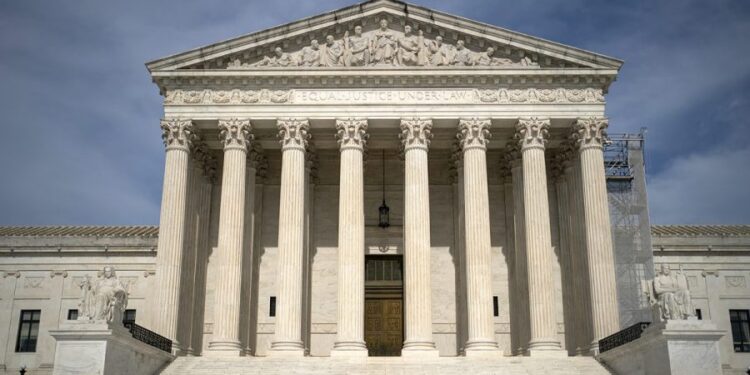
(The Hill) – The Supreme Court is increasingly being pulled into the upcoming presidential contest.
With a week to go until Election Day, the justices now have four election-related applications on their emergency docket.
Former independent candidate Robert F. Kennedy Jr. has made two requests to take him off the ballot in the swing states of Michigan and Wisconsin.
The Republican National Committee (RNC) is challenging who can cast provisional ballots in Pennsylvania, with potentially thousands of votes hanging in the balance. Meanwhile, Republican officials in Virginia are asking to remove more than 1,600 people from the voter rolls over accusations they are noncitizens.
The disputes are just some of the dozens of legal battles playing out in courts across the country surrounding this year’s presidential contest. Some of those cases, as well as new ones filed after Election Day, could ultimately reach the Supreme Court.
“I think there are legal issues that arise out of the political process. And so, the Supreme Court has to be prepared to respond — if — if that should be necessary,” Justice Ketanji Brown Jackson noted during an August interview with CBS.
Jackson is the only sitting justice who was not on the court when it rejected challenges to the 2020 election results, when former President Trump baselessly contested his loss to President Biden.
Four years later, many legal observers expect the high court will similarly be drawn into this cycle’s contest between Trump and Vice President Harris.
Though much of the litigation isn’t expected until after Election Day, the Supreme Court’s emergency docket has already heated up with four pending election-related matters.
After dropping his independent presidential bid, Kennedy is demanding the high court remove him from the ballot in Michigan and Wisconsin, insisting that state officials’ refusal to do so violates his free speech rights.
“Allowing Secretary Benson’s unlawful conduct to stand without any recourse not only has dire consequences related to the November 2024 election, but also opens the floodgates for Secretaries of State across the United States to have unfettered authority to violate the law,” Kennedy’s attorneys wrote in their Michigan application, referring to Michigan Secretary of State Jocelyn Benson (D).
The gambit is part of a broader effort by Kennedy to remove his name in swing states so his supporters vote for Trump, whom Kennedy endorsed, while remaining on the ballot elsewhere.
Officials in both Michigan and Wisconsin are pushing back, contending that Kennedy’s requests are impractical since voting is already underway.
Lower courts ruled against Kennedy, and he now faces an uphill battle. The Supreme Court rarely grants emergency relief and has previously refused similar ballot-access motions filed by Kennedy and Green Party candidate Jill Stein.
Beyond Kennedy’s applications, the justices also face two other election disputes arising from Virginia and Pennsylvania.
Virginia officials are fighting to void more than 1,600 voter registrations they claim represent noncitizens. The state is backed by all the nation’s 26 other Republican state attorneys general and the RNC.
The Justice Department convinced a lower-court judge to reinstate the voters because their removals took place within the federally mandated 90-day “quiet period” before an election, when states are barred from systematic voter purges.
“It is not a close case; it is instead a paradigmatic violation of Congress’s design,” a group of 17 former Republican lawmakers wrote in a friend-of-the-court brief Tuesday backing the Biden administration’s challenge.
The group includes former Reps. Adam Kinzinger (R-Ill.), Barbara Comstock (R-Va.) and Joe Walsh (R-Ill.), who have all crossed party lines to endorse Harris.
State election officials claim they removed noncitizens in part based on Department of Motor Vehicles forms the people completed without attesting they are citizens.
U.S. District Judge Patricia Giles, a President Biden appointee, when ruling against Virginia noted that citizens were quickly identified among those removed.
“They have already identified these citizens. How many more are there?” Giles quipped at a hearing last Friday.
Meanwhile, the Supreme Court is also considering an emergency appeal arising out of Pennsylvania that could impact thousands of voters.
The RNC is asking the justices to halt a 4-3 ruling from the state’s top court giving voters an option to have a provisional ballot counted on Election Day if their mail ballot was rejected for not being returned with a required secrecy envelope, referred to as a “naked ballot.”
Republicans claim the ruling doesn’t align with state law.
“Without this Court’s intervention, the county boards will count ballots that are unlawful under the Election Code. Once that happens, it will be impossible to repair election results that have been tainted by illegally counted ballots,” the RNC wrote in its application.
The MIT Election Data and Science Lab estimates roughly 1.1 percent of mail votes were voided as naked ballots in 2020.
This election cycle, more than 2.1 million Pennsylvanians have requested mail ballots, and more than 1.4 million have already been returned, according to data from Pennsylvania’s Department of State.
The Supreme Court’s intervention would prevent many impacted voters from having a second chance at participating in the election, as some Pennsylvania counties do not permit voters to cure such technical errors.
And despite being a relatively small share of the electorate, those ballots could make an outsized difference given the close state of the race.
The Decision Desk HQ/The Hill election forecast predicts that Trump has a very slight edge in the key battleground, giving him a 52 percent chance of winning.
In the same average of polls, Harris had been leading Trump in Pennsylvania up until last week, when he overtook her.
Trump now stands at 48.5 percent support in the average of polls in the Keystone State, compared to 48.1 percent for Harris. The state is widely seen as a must-win state for both candidates.







